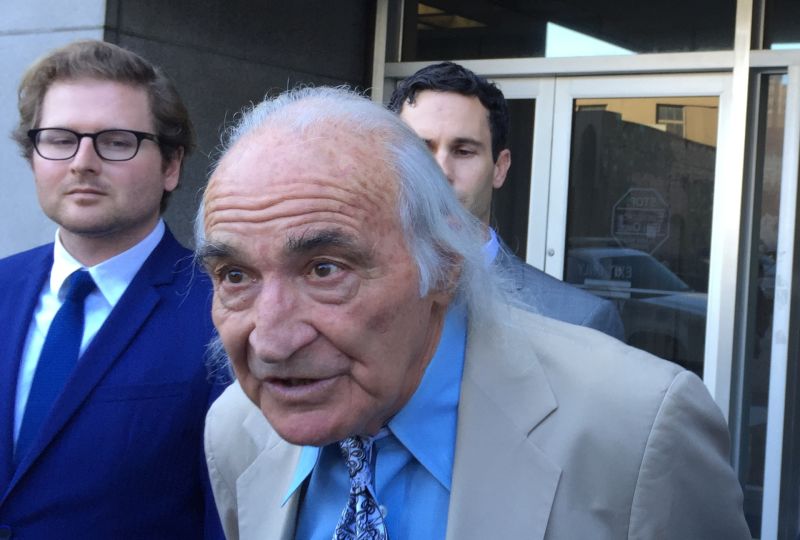The case, Hasib said, is about much more than the two murders, however.
"This case is about this group of people engaging in this pattern of criminal activity," he said. "Like planets revolving around the sun, this case is about the man at the center of that criminal universe."
Chow, who has done time in the past for racketeering, drug trafficking, arson, armed robbery and attempted murder, insists he is innocent of all charges and plans to testify in his own defense. His lead attorney, Tony Serra, told the jury Chow is a changed man whom the FBI spent millions trying -- and failing -- to trap in crimes.
"The evidence will not show that my client murdered or participated in the murder of anyone, period," Serra told the jury. He said the government added the murder charges to its sweeping criminal indictment at the last minute and only after securing the testimony of several cooperating witnesses with lengthy criminal records.
"All of these insiders, these cooperators, they jumped on the bandwagon right at the end, in order ultimately that they secure leniency with the sentencing that many of them face," Serra said.
The government's investigation has already resulted in several guilty pleas -- including that of former state Sen. Leland Yee, who in July admitted committing wire fraud, honest services fraud, bribery, extortion, firearms trafficking and money laundering.
Both defense lawyers and prosecutors say they'll prove their cases using the same secretly recorded statements, mostly collected by an FBI agent posing as a foul-mouthed East Coast Mafia member with business opportunities for members of Chow's Ghee Kung Tong. With the help of another agent who speaks Cantonese and posed as a "Shrimp Boy" groupie, agent David Jordan infiltrated the group in 2010.
"At one point Raymond Chow tells David Jordan, 'I don’t commit crimes myself, but I know lots of people who do. Would you like to meet them?' " Hasib said. "Almost immediately after meeting each one of these people -- sometimes within minutes, seconds -- David Jordan is able to conduct criminal activity."
From that point on, Chow's relationship with Jordan followed a predictable pattern, according to the prosecution. Chow would make an introduction -- or approve money laundering, drug trafficking, gunrunning or fencing of stolen property deals -- and Jordan would carry them out with an alleged Chow associate. The defense says the FBI provided almost $500,000 in fake black-market cigarettes alone.
After the deals, Jordan would bring Chow an envelope full of cash, and Chow would verbally refuse it.
"You will hear that Raymond Chow always stays an arm's length away from the criminal activity, says, 'No, no, no, I don’t want the cash,' " Hasib said. "But every time, Raymond Chow takes the envelope and drops it in his pocket."
Serra argued Chow was living on charity as a respected member of the Chinese community and hoping to soon publish a book about his life. But accepting money, he said, doesn't mean Chow was interested in or even aware of the crimes going on around him.
"He gave up that life," Serra said. "But he’s not a policeman. He’s not some kind of minister. He’s not going to go out and try to clean up some of the criminal activity that goes on in Chinatown."
Serra and his team are arguing that the FBI spent millions attempting to entrap an innocent man -- not only by giving cash to Chow and fronting thousands to be laundered but also by wining and dining suspects at fancy restaurants and high-end hotels.
Serra said the FBI spend more than $1 million on those kinds of out-of-pocket expenses.
"I invite you to dislike that," he told the jury. "It should trouble you."
After the jury was excused for the day, the government questioned Serra's math and said jurors should be allowed to know that much of their expenses were recovered through the illegal cash and property seizures.
U.S. District Court Judge Charles Breyer expressed concerns about Serra's argument and said he'd consider letting prosecutors inform the jury about the government's position on the expenses.
The first day of the criminal trial ended with two law enforcement witnesses called by the prosecution.
The first San Francisco police officer to arrive at the scene of Allen Leung's killing testified about the scene as prosecutors flashed a photographs of Leung's body -- face-down in a pool of blood -- and played a recording of the 911 call his wife made. Jenny Leung screamed and cried on the tape.
Then FBI agent William Wu testified about Leung's funeral. Formerly assigned to the FBI's Asian organized crime unit, Wu said law enforcement turned out in force for the funeral.
"A well-known member of the Chinese tong was murdered," he said. "We wanted to make sure that there was no violence."
The funeral was peaceful. Chow was photographed emerging from the ceremony in a bright white suit, despite dozens of people surrounding him and holding up newspapers and trying to block him from view. That wardrobe choice would inform the name of the FBI's "Operation White Suit."

